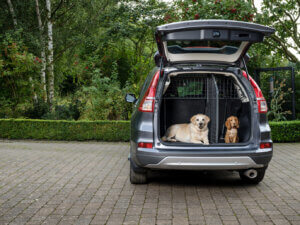In our household, if you tried to narrow it down, you’d probably find that much of the conversation revolves around the dog. “Did you give Fido a dental chew?”, “When’s his next appointment at the groomer?”, “Are you ready to take Fido for a walk with me?”. If you look even closer still, we tend to find that many of the discussions are about things that our dog does that just make us laugh out loud. Truly there is not a day goes by when he does not make us giggle and, for us, that is one of the joys of having a pet at home. However, for others that is not necessarily the case. Back in 2012, an article in a newspaper in the UK¹ suggested that dogs can cause more than 2,000 arguments in a household over the dog’s lifetime. In a poll conducted by the Associated Press-Petside,² approximately 14% of people would choose their dog over their own spouse. During the pandemic, more and more households welcomed a dog into their lives, but how does a dog affect your relationship with your partner? Take a look at our Valentine’s Day tips so the course of true love can (hopefully) run more smoothly.
Valentine’s Day tip number 1: Determine what will work for you both at the outset
Is your partner a dog lover? Some people cannot imagine being without a dog in their home, whereas others cannot imagine sharing their home with a pet. It can be very difficult for someone who does not like (or is afraid of) dogs to adjust to having a pet around. If your partner is allergic to pets, it can be an even bigger problem. A dog sensing fear or dislike from your partner does not make for a comfortable situation. Determining what will work for you both at the outset could be a smart move in the long term.
Tip number 2: How to blend households
Introducing a new person into a household can be confusing for dogs who are pack animals and enjoy knowing where everyone sits in the pecking order. Your dog’s home is his territory and he will want to protect it. Introduce a partner gradually and start on neutral ground. Make sure your partner and your pet are very used to one another before you get to the moving-in stage. When your partner does move in, make sure that the pet’s sleeping areas are not compromised. If you are blending households that both contain pets, introduce the pets on neutral ground. The pets should be very familiar with each other before living under the same roof and need to be comfortable at home and on the road. At home make sure each dog has his own special place and try to do the same in your vehicle.
Travall has products that can help dogs from both families to feel at ease on the road. Why not kit both your vehicles out with the perfect dog transport system in the form of Travall’s Safety Plus Pack comprising pet barrier, trunk divider and cargo mat? Keep both dogs securely positioned in both of your cars – it could be the perfect Valentine’s Day gift.

Valentine’s Day tip number 3: Compromise
For many dog owners, their dog is like their child. Just as parents would discuss raising kids, owners should discuss training, behavioral issues, and how much time, money, and attention should be devoted to the dog. As with any relationship, make compromises where necessary and show kindness and compassion. Disputes over the dog can range from who should walk the dog to where the dog sits in your vehicle. Determine what the issues are in your household and how you can resolve them. When you decide on a household rule, stick to it. Don’t expect your partner to love your pet as much as you do. As long as your pet is treated well by your partner and your pet is friendly in return, that can be OK. Try to share out tasks involved in the care of your pet between you, but be prepared (and content) to take on the lion’s share of the work.
Tip number 4: Resolve jealousy issues
You mean everything to your dog and you mean everything to your partner! It can be difficult for your dog and for your significant other to see affection directed elsewhere. Don’t neglect to spend time with your dog after your partner has moved in and try to ensure that your partner also builds a relationship with your dog by spending time, giving treats and plenty of attention.
Valentine’s Day tip number 5: Talk to an expert
If your normally well-behaved dog starts behaving badly, take notice. It could be a sign that your pup is not happy with the new situation. Don’t allow your dog to get away with bad behavior, and try to tackle the issue as soon as possible. Whatever the problems that you encounter, don’t just let them fester and get advice from an expert such as a veterinarian or a dog behavioral health specialist.
References
- http://www.dailymail.co.uk/news/article-2084835/Mans-worst-friend-Average-dog-causes-2-000-family-arguments-lifetime.html#ixzz4W2PLYhQ2
- http://www.apgfkpoll.com October 2010